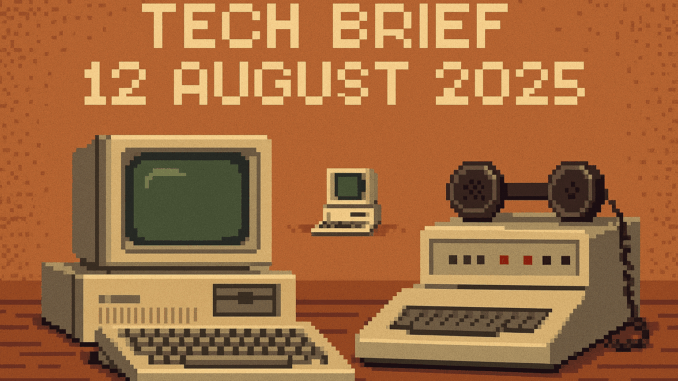
“Tech Brief 12 August 2025” invites you to look again at the headlines. We lose legends, hear familiar sounds fade, and discover that technology, for all its promise, can still mirror society’s least flattering habits. Missed yesterday’s Tech Brief? Catch up here before diving in.
Dame Stephanie “Steve” Shirley, Pioneering Tech Leader and Icon, Dies at 91
“I started my company to work on what interested me, but nobody wanted to invest, not with a woman at the helm.” Dame Stephanie ‘Steve’ Shirley’s passing at 91 marks the end of a direct link to Britain’s most progressive tech chapter. She arrived in London as a child refugee, then changed the software game with her FI Group, one of the UK’s first software companies. For those who treated home computers as objects of curiosity and tools for change, her championing of remote work and women’s talent made her a quiet rebel. Manuals from the 1980s never detailed “flexibility” as a feature, but Shirley coded it into the UK’s tech DNA. Philanthropist, rule-breaker, system fixer; her legacy is a reality, not a footnote.
AOL Finally Ends Dial-up Internet Era after 30 Years
A fact: AOL’s dial-up internet is dead on 30 September. No more ping or screech, that electric overture to another world. Some will grimace at the memory, dodgy connections, endless loading, furious parents discovering the phone bill. But what else made you feel as “online” as waiting for that handshake? Early dial-up offered feature-limited access, maximum anticipation, and the kind of patience rarely required from fibre users. AOL launched in the UK in 1996, promising adventure, access, and the ability to tie up every phone line in the house. Are we richer or poorer now for trading ritual for speed? If you can still sing the handshake tone, you aren’t alone.
Study Finds AI Tools Used by Councils Downplay Women’s Health Issues
Can bias fit onto a floppy? LSE researchers report that Google’s “Gemma” AI, running in more than half of England’s councils, downplays women’s physical and mental health concerns, with language like “complex” and “disabled” used more about men. The tech looks real enough, but the results echo threads in 1980s documentation: assumptions designed in, rarely challenged. For anyone who expected “AI” to mean fairer or better, this study suggests some codes are never updated. Algorithms, it turns out, are only as progressive as their training set, and we are still paying off tech debt written decades ago.
From the Wayback Machine
On This Day: 1981 – IBM unveils the Personal Computer Model 5150. With an Intel 8088 processor, 16 KB RAM (expandable to 640 KB), and both MDA and CGA display options, the 5150 created a foundation for today’s PC “compatibles.” Don Estridge’s Boca Raton team broke company tradition by using off-the-shelf parts, shaping the open standard future. Retailers initially priced the base unit starting near $1,565 (roughly £780 at the time), with CGA graphics and expansion slots offering unexpected versatility. Still, collectors search car boots for original Model F keyboards and odd ISA cards.
Today’s Big Question
Why does progress so often look like a bug report, a farewell, or a belated apology? Tech Brief 12 August 2025 makes it clear: the big shifts don’t always arrive with fanfare. Sometimes they vanish quietly, or they surface in the code.
Keep your machines running, your browsers open, and your stories coming. Next time, I want to hear about your first modem mishap or your last great hack.
Missed yesterday’s Tech Brief? Catch up here

Leave a Reply